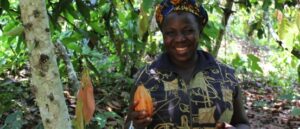
The Democratic Republic of Congo was once considered the breadbasket of central Africa, but due to war and insecurity the production of crops and farmer livelihoods have declined. Investment in creating income-generating opportunities is the fastest and most sustainable way to lift the Congolese people out of the cycle of poverty.
Nearly 90% of all arable land in Congo remains uncultivated, largely due to insecurity. That represents over 300,000 square miles of farmable land, roughly the size of Texas.
One area ripe for investment is agriculture, and cocoa in particular. As the demand for cocoa increases in the global market more emphasis is placed on identifying new sources, and DRC has great potential for meeting consumer demand. In a country where the destabilizing influence of natural resources is often deemed a catalyst for further conflict, cocoa is a ‘conflict-proof’ resource since the real value of cocoa is found in the production stage, which occurs outside the DRC.
Since 2010, Theo Chocolate and Eastern Congo Initiative have cooperated to support Congolese farmers increase the quality and quantity of their cocoa production, to increase livelihoods and increase quality of life for their families and communities. Theo Chocolate has imported 340 tons of organic, fair-trade certified cocoa from eastern Congo, as explained in Joe Whinney and Whitney Williams’ recent article in the Seattle Times. Theo Chocolate will purchase another 500 tons of Congolese cocoa from the current harvest, and all of their dark chocolate bars now contain cocoa from the DRC. This highlights that Theo’s investment in Congolese cocoa is trade, not aid, and makes sense from a business perspective.
I’m excited about cocoa’s potential here. Congo’s national annual cocoa production has doubled every year for the past five years, and DRC recently gained a B3 credit rating from Moody’s.
However, significant obstacles remain to the consistent production of high-quality and high-quantities of cocoa in eastern Congo. Farmers have limited awareness of relevant good agricultural practices (GAPs), and have limited connection with the rest of the value chain. A recent conversation I had with a cocoa farmer in Watalinga, a cocoa-producing region of eastern Congo, highlights the stark disconnect between farmers and the final marketplace. She said to me:
‘What’s my cocoa used for? I don’t know…to make clothes, or shoes?’
It is critical to increase farmers’ access to information and knowledge surrounding good agricultural practices and pricing. Knowledge is power, and I have seen first hand that when a farmer is given knowledge they use this as their currency to effect positive change.
Last week, ECI staff traveled up to Beni, around 220 miles north of Goma, along with Theo Chocolate founder Joe Whinney to participate in a workshop that ECI coordinated with two consultants: Dennis Macracy and Matthew Quinlan. The purpose of the workshop was to engage key stakeholders in the cocoa supply chain to agree on the GAPs that farmers need to deploy to improve their cocoa production, increase their income, and improve quality of life for their families and communities. The workshop was informed by research conducted by ECI in partnership with students at a local university – UCBC – who is an ECI grantee. The research sought to understand the techniques currently used by cocoa farmers, in order to better understand how to improve their production.
These practices will be shared and operationalized in farms across eastern Congo in January 2014. ECI will work in partnership with key local actors, as well as Theo Chocolate, to initiate a cocoa project in Watalinga that will provide farmers with the knowledge, tools and skills to earn a greater income through cocoa production. This will allow thousands of cocoa farmers to send their children to school, secure better healthcare for their families, and put food on the table.
You can buy, and learn more about, Theo Chocolate’s Congo chocolate bars online here, made using only Congolese ingredients. (I recommend the delicious ‘Vanilla Nib!’)

Baraka Kasali is a Program Officer at Eastern Congo Initiative and lives in Goma.
He is Congolese, but spent most of his childhood between Chicago and Nairobi – Baraka@easterncongo.org
